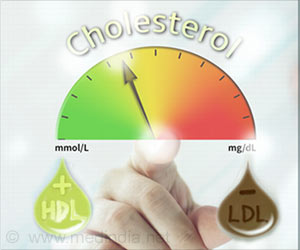Potential new drug targets for bringing down cholesterol or triglyceride levels have been identified by scientists.
Potential new drug targets for bringing down cholesterol or triglyceride levels have been identified by scientists.
They have discovered 11 new sites in the human genome where common variations seem to influence cholesterol, bringing the total number of lipid-associated genes to 30.While major mutations in some of these genes have been known to underlie rare lipid metabolism disorders, it is becoming apparent that common changes in the same genes that have modest effects can combine with risk-associated variants in other genes to significantly influence blood lipid levels.
"Finding new gene regions involved with lipid levels could improve our understanding of cholesterol regulation, help identify individuals who are at greater risk for heart disease, and point out new targets for drugs to control cholesterol levels," Nature quoted Sekar Kathiresan, MD, director of Preventive Cardiology at Massachusetts General Hospital (MGH), the paper's corresponding author, as saying.
Based on previous work that linked common variants at 19 locations to lipid levels, the researchers first conducted a meta-analysis of seven genome-wide association studies of blood lipid levels.
Potential lipid-associated sites identified in that first-phase analysis of data from almost 20,000 individuals - including participants in the Framingham Heart Study, which first established blood cholesterol as a risk factor for heart disease in 1961 - were then genotyped using DNA samples from another 20,600 participants in five different studies.
This validation phase found 30 gene sites, including the 19 previously identified, that were associated with levels of either high-density lipoprotein cholesterol, low-density lipoprotein cholesterol or triglycerides.
Advertisement
Others of the novel genes had no previous link to lipid metabolism. Some of them appear to be transcription factors, which control how other genes work, or enzymes that modify the molecules that transport cholesterol in the blood, but the function of others is still unknown.
Advertisement
With rare mutations, gene function is usually is completely abolished, but these common variants appear to affect the quantity but not necessarily the quality of protein being produced," Kathiresan said.
The study will appear online in the journal Nature Genetics.
Source-ANI
SPH













